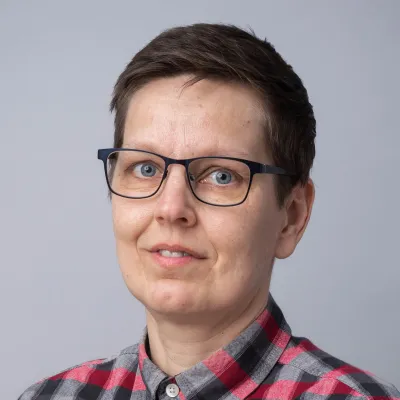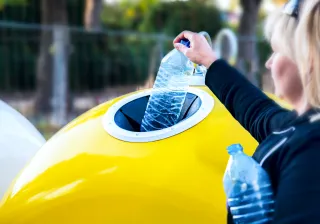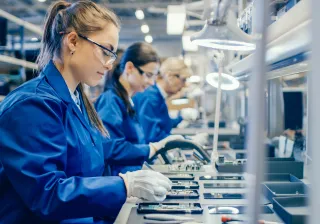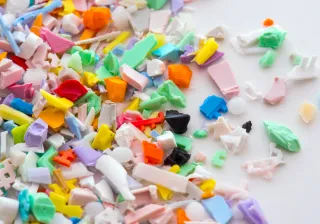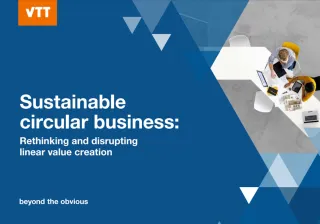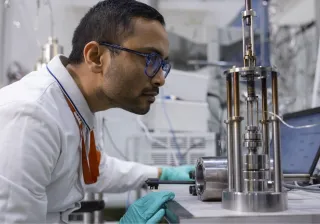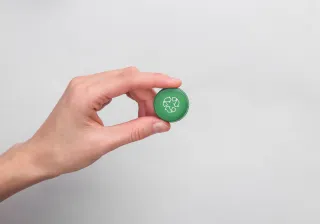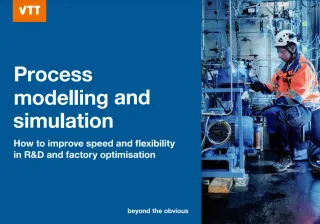Funding from Business Finland and partners enabled CH-Polymers to utilise the expertise of VTT’s researchers and experts, and expand the company’s cooperation network. The joint project resulted in a concept for a circular economy of polystyrene waste.
Key facts
R&D cooperation in joint projects can accelerate the business development and innovation efforts of small and medium-sized enterprises (SMEs) and expand their know-how.
The Business Finland funded MoPo research consortium, led by VTT, allowed CH-Polymers to investigate a sustainable option of circulating polystyrene back to a raw material.
As a result, the project presented a technically and economically feasible solution for recycling polystyrene.
CH-Polymers, established in 2009, supplies high quality binders for the paper and packaging, nonwoven and paints & coatings industries. The company has one of the leading laboratories in Europe for polymer emulsion development and application testing, and its production plant in Kaipiainen, Finland, is among Europe’s largest acrylic dispersion plants.
With a focus on sustainability and developing greener products, CH-Polymers is constantly working in cooperation with its academic and commercial network to ensure the company’s competitiveness.
This project gave us an excellent opportunity to participate in carrying out basic research.
Enhancing research capabilities
Business Finland offers funding for research, product development and many kinds of business development needs, also for small and medium-sized enterprises. Access to research cooperation helps SMEs to accelerate the development of their business and expand their know-how. One of the objectives of Finland’s Government Programme is to strengthen the cornerstone of the economy and exports through doubling the number of growth-oriented, medium-sized companies led by entrepreneurs by 2030.
According to R&D Manager Gun Lundsten at CH-Polymers, the company has positive experiences of several Business Finland funded projects, and can recommend the model for all growth-oriented SMEs. A good example is the MoPo project (Multitechnological recycling for polystyrene) led by VTT, which brought together several partners to explore how the recycling of polystyrene could be substantially increased by reshaping its collection and handling.
“We have been researching recycled and biobased raw materials for some time now and were especially interested in the possibility of converting waste into high quality styrene monomers that can be used to replace virgin materials in our processes. This project gave us an excellent opportunity to participate in carrying out basic research,” Lundsten says.
She adds that networking and establishing new contacts with potential partners is another important benefit of joint research projects for SMEs. The MoPo project is a case in point, as it initiated cooperation on a separate project between CH-Polymers and another company, Lundsten reveals.
Huge potential for recycled material
VTT’s Senior Principal Scientist Anja Oasmaa explains that since the MoPo project was aimed at developing a concept for a circular economy of polystyrene, the entire value chain from feedstock collection to end products was investigated. The study revealed that polystyrene waste has high recycling potential and techno-economic feasibility.
“Not all polystyrene waste is suited for mechanical recycling, so thermochemical recycling methods were developed in the project as well. When pyrolysed (heated in the absence of oxygen) polystyrene is disintegrated into styrene monomers that can then be used to replace virgin styrene monomer or as raw material for polystyrene,” Oasmaa says.
She adds that although this method has been proven to be highly cost-efficient, the challenge is organising the large-scale separate collection of polystyrene, which is currently limited in Finland.
Considering the results of the MoPo project, CH-Polymers’ Lundsten is very happy with the quality of the styrene monomers that were further refined in cooperation with Aalto University. Using vacuum distillation, a purity level of more than 99.7 wt% was reached. Also, the use of the resulting styrene monomer in making styrene-acrylic binders was verified successfully by CH-Polymers.
“As soon as recycled styrene is available commercially on a larger scale, we would be very interested in using it to replace other material sources in our production,” Lundsten notes.
VTT has joined forces with Sulzer Chemtech to advance the development and popularisation of a fully integrated processing train that converts poorly recycled waste polystyrene into high-purity styrene suitable to produce various grades of styrenic polymers.
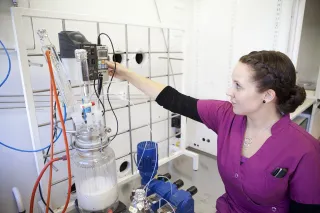
Strength in numbers
The MoPo project is an example of Business Finland’s Co-Innovation funding for a joint project, where public research projects by research organisations and confidential R&D projects by companies are carried out simultaneously in close cooperation.
According to Riikka Reitzer, Co-creation Manager at VTT’s Sustainable Products and Materials business area, VTT has an important role in building consortium projects that involve operators throughout the value chain.
“These types of projects offer excellent opportunities for smaller companies to demonstrate their own technologies and know-how, and gain valuable contacts. Also, teaming up in a joint project increases the probability of receiving funding,” Reitzer points out.
A recently launched, ongoing funding call from Business Finland targeted at SMEs requires at least three companies to participate in the project. Funding is granted for a Co-Research project implemented by an individual research organisation or jointly by several research organisations. The application period will close on 29 November 2024 and funding decisions will be announced in early 2025. Business Finland funding for a Co-Innovation joint project can be applied for continuously.
